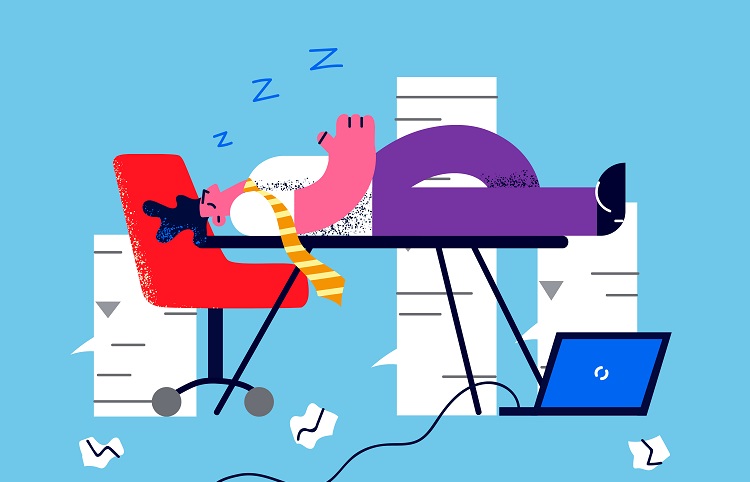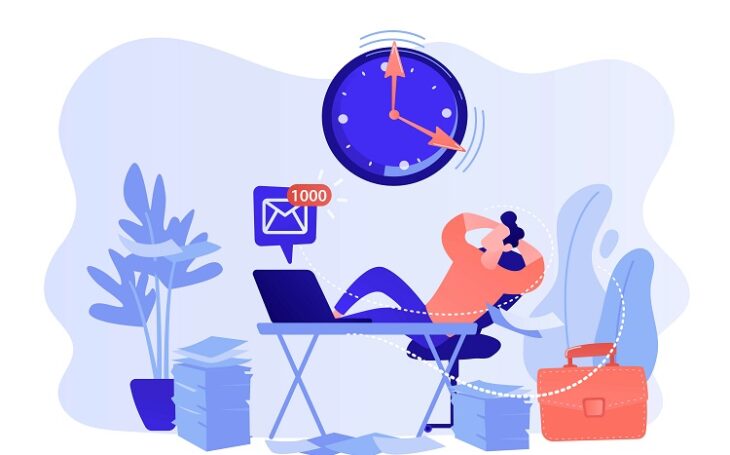Merriam-Webster describes procrastination this way:
“To be slow or late about doing something that should be done: to delay doing something until a later time because you do not want to do it because you are lazy, etc.”
But research shows that there is more behind procrastination than what the latter part of this definition states.
The idea that procrastination is a product of laziness may be perpetuated by the lack of research regarding procrastination stats. Joseph Ferrari, a professor of psychology at DePaul University in Chicago, hypothesizes that procrastination hasn’t been taken seriously in academia because many academics struggle with procrastination themselves.
Most people who struggle with procrastination are far from lazy. In fact, many of them are highly stressed and overworked.
If you struggle with procrastination, you are neither lazy nor alone.
The following facts, trends, and statistics can offer you insight into what is really behind procrastination and how to combat it, which might just change your life.
Table of Contents
ToggleProcrastination Stats, Trends, and Facts for 2024
While everyone puts off doing unpleasant tasks at some point in their life, chronic procrastination is on the rise.
- In the 1970s, only 5% of adults were considered to be chronic procrastinators, but today that percentage has grown to 20%.
- 25% of adults say that procrastination is a defining characteristic of their personality.
- As lines between work and life blur, procrastination is becoming increasingly more common, especially forms of bedtime procrastination.
- Women are twice as likely as men to suffer from severe bedtime procrastination.
- People with low self-confidence, difficulty setting realistic goals, task aversion, and high levels of distractibility and impulsivity are most likely to fall victim to procrastination.
Statistics about the Prevalence of Procrastination 2024
- Studies show that around 20% of adults procrastinate chronically.
- Studies show that around 50% of college students procrastinate in a consistent and chronic manner, 75% consider themselves to be procrastinators, and 80%–95% of college students procrastinate.
- In a study on an adult sample, 74% of the people who were surveyed indicated that they go to bed later than they planned at least once a week, with no external reason for doing so.

Just how prevalent is procrastination today?
- Studies revealed that 15%–20% of adults regularly procrastinate.
- An estimated 80%–95% of college students procrastinate at some level, while 50% consider it to be a problem.
- In one study, 88% of those surveyed said they procrastinate for at least one 1 hour daily.
- More people struggle with procrastination than suffer from alcoholism, substance abuse, and depression.
Causes of Procrastination Facts 2024
It is difficult to pinpoint exactly what causes the self-sabotaging behavior which is procrastination. Consider the following research that offers suggestions as to why so many people procrastinate.
- In the past, procrastination has often been considered a time-management issue, but recent research suggests that procrastination is linked to mood regulation.
- Procrastination is characteristic of ADHD, depression, and anxiety.
- There are different hypotheses on whether access to technology increases procrastination. Some experts suggest that new technologies have always been around or accessible, and it was a matter of whether or not individuals used them. Others state that the highly tailored ads and billions of videos targeted to individuals’ specific interests absolutely heighten procrastination rates.
Impact of Procrastination Facts and Statistics 2024
Chronic procrastination is dangerous. It has been linked to both negative mental and physical health problems.
- Studies indicate that chronic procrastination can severely impact mental health, exacerbate stress, and lower a person’s general well-being.
- 94% of survey respondents indicated that procrastination negatively affects their happiness.
- Chronic procrastinators are more likely to suffer from issues like headaches, colds, and digestive issues.
- A 2015 study also shows a correlation between chronic procrastination and hypertension and cardiovascular disease.
- Procrastination has been linked to underperformance, financial difficulties, and negative self-esteem.
Academic Procrastination Statistics
Schools are no strangers to procrastination. Students in high school, college, and beyond are prone to procrastination.
- 53% of high school students, 53% of undergraduate students, and 61% of graduate students are frequent procrastinators.
- Procrastination amongst undergraduates is most common when writing term papers (46%), followed by weekly readings (30%) and studying for tests (28%).
- Graduate students procrastinate more with weekly readings (60%), followed by writing term papers (42%), and studying for tests (39%).
Workplace Procrastination Statistics

Adults continue to struggle with procrastination in the workplace.
- 80% of employees earn a salary and 76% of entrepreneurs spend 1 to 4 hours procrastinating on any given day.
- Procrastinating 3 hours per day costs businesses $15,000 annually for a $40,000 salaried worker.
Current Procrastination Statistics
Consider the most recent findings on procrastination.
- In a 2020 survey, 12.4% of workers reported struggling with procrastination since the COVID-19 pandemic.
Other Interesting Procrastination Facts & Statistics
Curious about other unique facts regarding procrastination? Below are some nuggets of information we found particularly interesting.
- Learning mood regulation skills may help some people overcome chronic procrastination.
- In 2014, cat videos garnered nearly 26 billion views on YouTube. A 2015 survey of 7,000 people found that procrastination was a leading cause of this trend. It was reported that the positive feelings associated with watching cat videos often offset the negative feelings that stemmed from procrastination.
- One study found that students who practiced self-forgiveness in regards to procrastinating while studying for an exam were less likely to procrastinate while studying for the next exam.
- Bedtime procrastination is a growing trend that has three distinct features: the person has no specific reason for staying up, the person knows there may be negative consequences of staying up late, and it lowers a person’s overall amount of sleep at night.
- One form of bedtime procrastination is referred to as “revenge bedtime procrastination,” a phenomenon amongst workers who experience high levels of stress or long working hours in the workplace. It is used as a way to “take back” personal leisure time that they feel is stolen during the day. This is done at the expense of quality sleep. A study conducted in 2020 indicates that 40% of adults had increased sleep issues related to the pandemic.
- The International Journal of Applied Positive Psychology conducted a study that found people were more likely to stay on task when practicing mindfulness exercises.
You might be interested to check those related posts as well:
- 159 Important SEO Stats 2024 [Facts and Trends]
- 25 Shocking College Graduation Statistics 2024 [Facts and Trends]
- 22 Impressive Napping Statistics 2024 [Facts and Benefits]
FAQs
Where is procrastination most common?
One study suggested that Japanese students have the highest rate of procrastination, followed by students in Taiwan, Hong Kong, the U.S., Australia, and New Zealand.
Which age group procrastinates the most?
One study found that procrastination decreased with age. Young people, ages 14-29, had the highest rates of procrastination. In this particular age group, though no others, it was also found that males procrastinated more than females.
How long does the average person procrastinate?
A YouGov survey found that people spend approximately 218 minutes procrastinating daily, which is equivalent to 55 days per year!
Conclusion
Many people feel trapped by their habitual procrastination, but it doesn’t have to be a lifetime sentence. Practicing self-forgiveness and mindfulness can help you overcome procrastination, as can learning other mood-regulating skills.
So, be kind to yourself, and go get started.
Statistics for this article were gathered from the following sources:
- Good Therapy
- Darius Foroux
- Edutopia
- International Proceedings of Economics Development and Research
- Slate
- Solving Procrastination
- Statista
- The Creatives Hour
- The New York Times
- The Telegraph
- University Affairs
- US National Library of Medicine/National Institute of Health
- VeryWellMind




